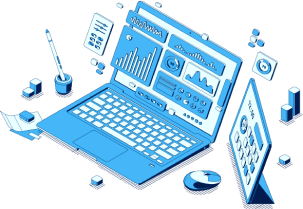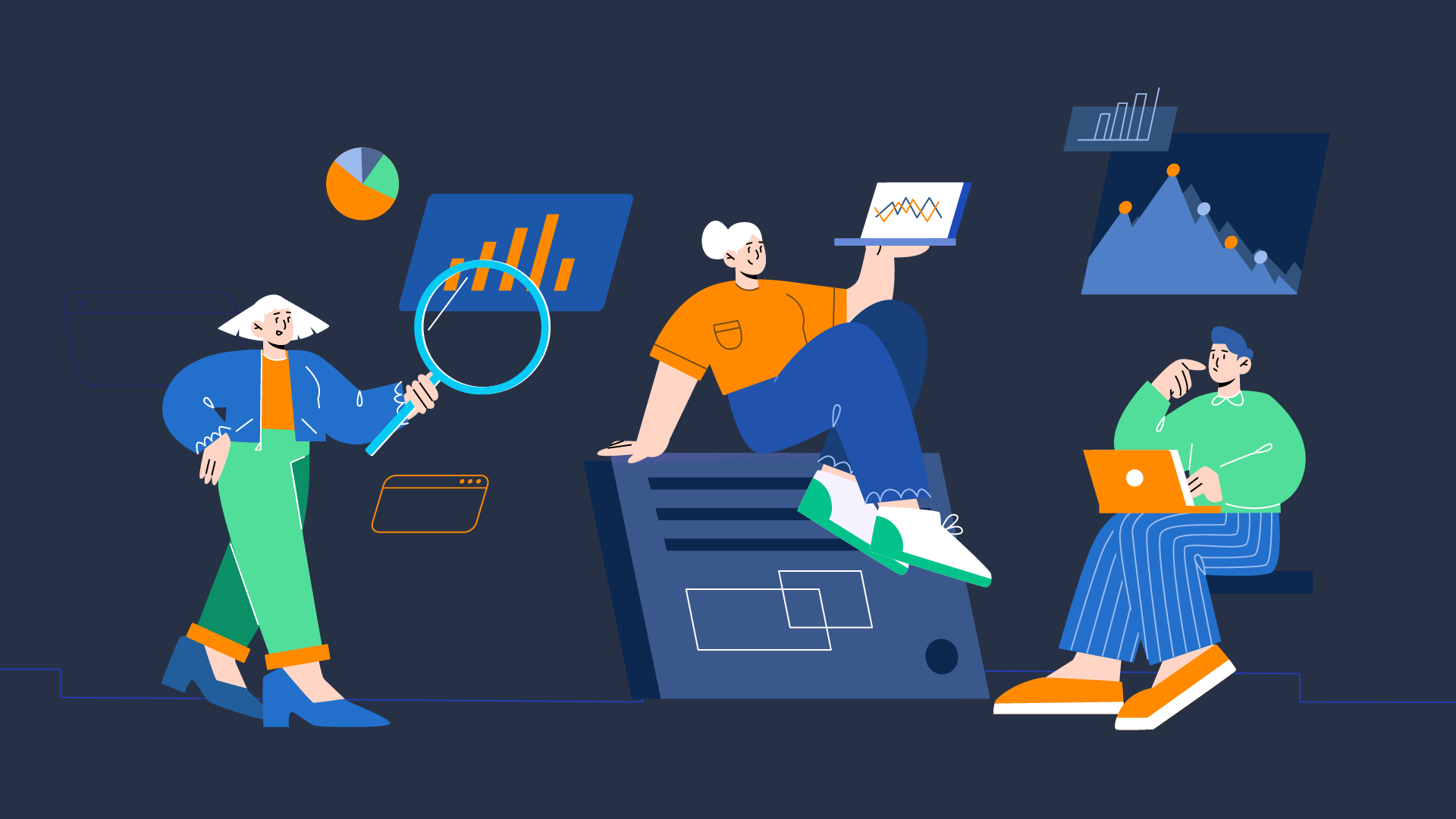Related courses
See All CoursesHow to become a Data Scientist
Data Scientist Job Overview

What is Data Science
Data Science is a multidisciplinary field that involves extracting insights and knowledge from data using scientific methods, algorithms, and technologies. Key characteristics of Data Science include:
- Interdisciplinary Approach: Data Science combines expertise from various disciplines such as mathematics, statistics, computer science, domain knowledge, and data visualization;
- Data Exploration and Analysis: Scientists explore and analyze large and complex datasets to identify patterns, trends, and relationships. They employ statistical techniques, data mining, and machine learning algorithms to extract meaningful insights;
- Problem-Solving and Decision-Making: Data Science aims to solve real-world problems and make informed decisions based on data analysis. It involves formulating hypotheses, testing them, and deriving actionable insights to address business or scientific objectives.
- Predictive Modeling and Forecasting: Data Scientists develop models to predict future outcomes or behaviors based on historical data. These models can be used for forecasting, risk assessment, optimization, and other predictive tasks;
- Data Visualization and Communication: Data Scientists use visualizations and storytelling techniques to communicate their findings to stakeholders effectively. This involves creating compelling visual representations of data to facilitate understanding and decision-making.
Overall, Data Science aims to extract knowledge and actionable insights from data to drive innovation, solve complex problems, and make informed decisions in various domains.
Run Code from Your Browser - No Installation Required

Data Science vs. Data Analytics
Note
You can read more about Data Analytics here
Data Science and Data Analytics are closely interconnected fields with common tasks such as data analysis, forecasting, and uncovering insights. In many smaller companies, these roles may be combined, with a single individual functioning as both a data scientist and a data analyst. However, despite the overlap, these roles have distinct differences, which we will explore in detail below.
-
The roles of data analysts and data scientists are situated at different levels within the project hierarchy:
- Data analysts typically operate at a higher abstract level. Their responsibilities encompass determining the required data, interpreting it, formulating hypotheses, devising methods to validate these hypotheses, creating predictions, and effectively communicating the final results through data visualizations;
- Conversely, data scientists work more closely at a lower level. They are directly involved in model creation and evaluation, data processing, as well as writing pipelines, and handling ETL (Extract Transform Load) processes.
-
Different technologies are utilized by data analysts and data scientists to carry out their tasks:
- Data analysts primarily employ a range of statistical methods and visualizations that are user-friendly and do not necessitate significant costs for development and evaluation;
- On the other hand, data scientists work with a broader spectrum of tools, including machine learning algorithms, neural networks, and diverse scripts and pipelines.
-
They possess distinct educational backgrounds:
- Data analytics specialists primarily come from mathematical or economic backgrounds;
- Conversely, data scientists are computer science specialists who are well-versed in statistical analysis and machine learning algorithms and possess knowledge in software development, computer networks, and related areas. This multifaceted skill set enables them to integrate algorithms into project structures effectively.
Data Science Lifecycle
The Data Science lifecycle refers to the step-by-step process followed in a typical Data Science project. It encompasses various stages, from understanding the problem and gathering data to deploying and maintaining the models.
While the specific steps may vary depending on the project and organization, the general Data Science lifecycle includes the following stages:

The Data Science lifecycle provides a structured approach to guide Data Scientists through the various stages of a project, ensuring that the process is systematic, rigorous, and focused on delivering actionable insights and value.
Start Learning Coding today and boost your Career Potential

Data Science Specializations
Data Science encompasses various specializations that focus on different aspects of data analysis, modeling, and application. Some common specializations within Data Science include:
Machine Learning
This specialization focuses on developing and applying algorithms and statistical models that enable computers to learn from and make predictions or decisions based on data. It involves techniques such as supervised learning, unsupervised learning, and reinforcement learning;
Data Mining
Data mining involves extracting useful patterns and insights from large datasets. It utilizes techniques such as clustering, association rule mining, and anomaly detection to uncover hidden patterns, relationships, and trends in data;
Natural Language Processing (NLP)
NLP deals with the processing and analysis of human language data. It involves tasks such as sentiment analysis, text classification, language generation, and machine translation. NLP is used in chatbots, language understanding systems, and text analytics applications;
Computer Vision
This specialization focuses on extracting information and understanding from visual data such as images and videos. It involves tasks such as image classification, object detection, facial recognition, and image segmentation. Computer Vision finds applications in areas like autonomous vehicles, surveillance systems, and medical imaging;
Big Data Analytics
Big Data Analytics involves handling and analyzing massive volumes of structured and unstructured data. It includes data storage, processing, and analysis techniques on distributed computing frameworks like Hadoop and Spark. Big Data tools like Apache Hive, Apache Pig, and Apache Kafka are commonly used;
Time Series Analysis
Time Series Analysis deals with analyzing and modeling data ordered and indexed by time. It is used to identify patterns, trends, and seasonality in time-dependent data. Time series models, such as ARIMA and exponential smoothing, are used for forecasting and anomaly detection;
Data Visualization
Data Visualization focuses on creating effective visual representations of data to facilitate understanding and exploration. It involves using tools like matplotlib, seaborn, and Tableau to create charts, graphs, and interactive dashboards for data analysis and presentation;
Deep Learning
Deep Learning is a subfield of Machine Learning that focuses on training deep neural networks with multiple layers. It is used for complex tasks such as image recognition, natural language processing, and speech recognition. Popular Deep Learning frameworks include TensorFlow, PyTorch, and Keras.
In Data Science, the tools depend on the specific specialization and tasks. Commonly used tools include Python (with libraries like NumPy, Pandas, and Scikit-learn), R programming language, SQL for databases, Apache Spark for big data processing, Jupyter Notebook for coding and documentation, and visualization libraries like Matplotlib and D3.js. Cloud platforms like AWS, Google Cloud, and Microsoft Azure provide scalable data processing, storage, and machine learning services.
Thus, we can conclude that Data Science is a comprehensive science that includes many other sciences. A data science specialist is a person who knows everything about working with data and knows how to use it effectively to solve business problems. But do not despair, we will help you start mastering this science with the help of several tracks:
FAQs
Q: What is data science, and what does a data scientist do?
A: Data science is an interdisciplinary field that involves extracting insights and knowledge from data using various techniques, including statistical analysis, machine learning, and data visualization. Data scientists use their expertise in programming, mathematics, and domain knowledge to analyze data, build predictive models, and make data-driven recommendations for business decisions.
Q: How to become a Data Scientist?
A: A successful data scientist should have a strong foundation in programming languages like Python or R, proficiency in data manipulation and analysis using libraries like pandas and NumPy, and knowledge of machine learning algorithms. Additionally, skills in data visualization, statistical analysis, and domain-specific expertise are valuable for effective data science projects.
Q: How does data science benefit businesses and industries?
A: Data science empowers businesses to make informed decisions based on data-driven insights, optimize processes, and improve efficiency. It enables companies to identify patterns, trends, and customer preferences, leading to better-targeted marketing strategies, product recommendations, and personalized customer experiences.
Q: What steps are involved in the data science process?
A: The data science process typically includes data collection and cleaning, exploratory data analysis, feature engineering, model building and training, model evaluation, and deployment. Each step requires careful consideration and validation to ensure the accuracy and reliability of the results.
Q: How does data science contribute to solving societal challenges?
A: Data science plays a vital role in addressing societal challenges such as healthcare, climate change, and poverty. It aids in medical research, climate modeling, and resource allocation, providing valuable insights to governments, organizations, and NGOs to make data-informed decisions for the betterment of society.
Related courses
See All CoursesData Analyst vs Data Engineer vs Data Scientist
Unraveling the Roles and Responsibilities in Data-Driven Careers
by Kyryl Sidak
Data Scientist, ML Engineer
Dec, 2023・7 min read

6 Rules for Using ChatGPT Effectively
Using ChatGPT Effectively
by Sofiia Piustonen
Data Scientist
Aug, 2023・6 min read

Google Colab Tutorial
Google Colab
by Andrii Chornyi
Data Scientist, ML Engineer
Feb, 2024・11 min read

Content of this article